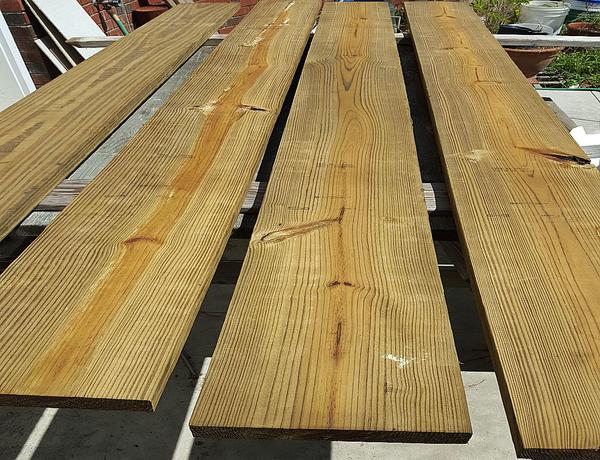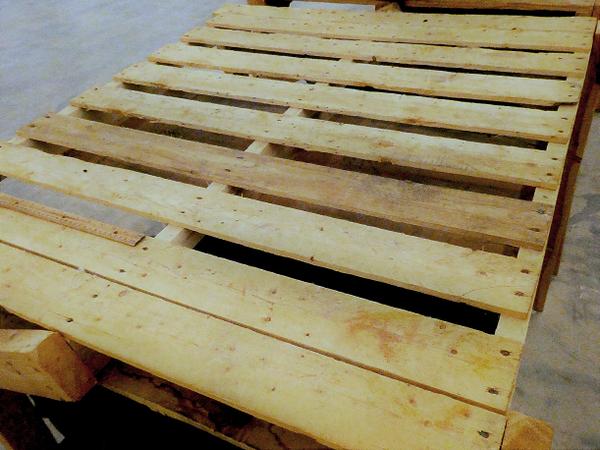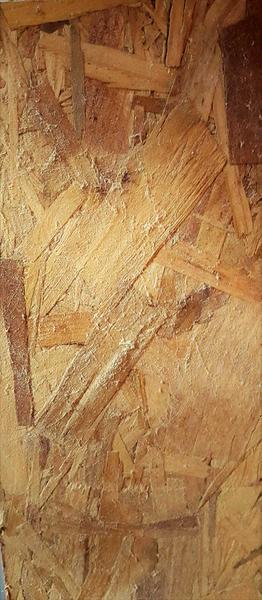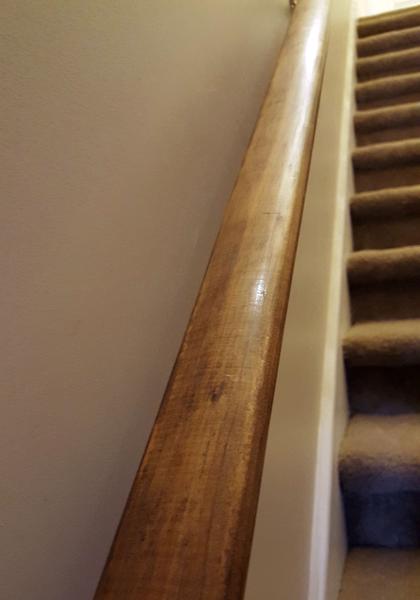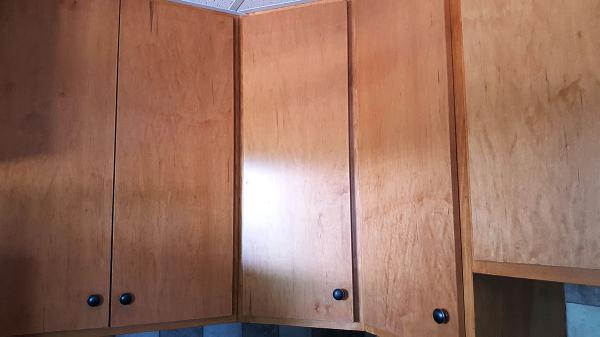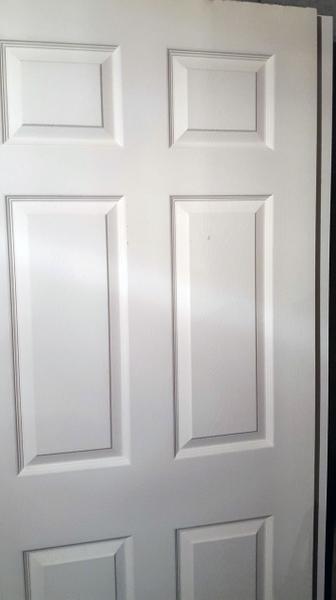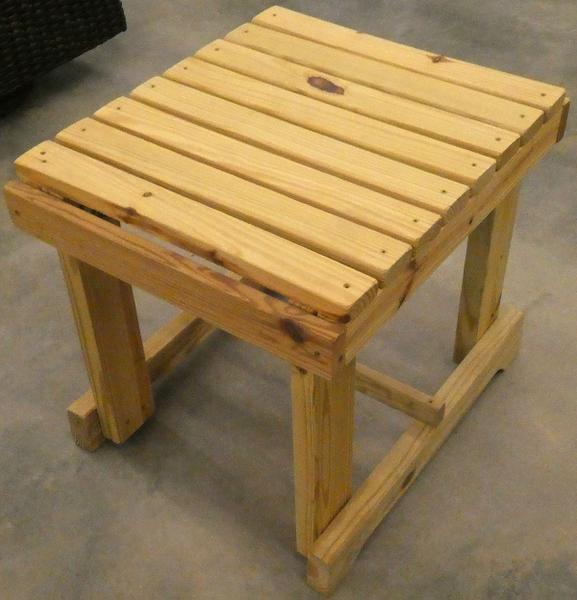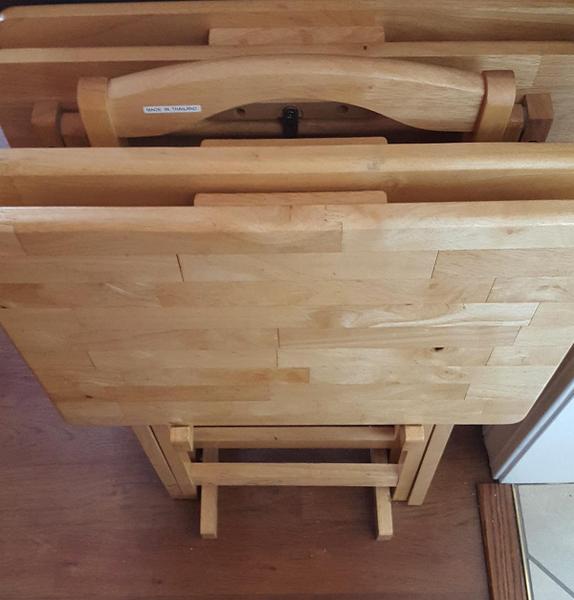Introduction
We were tasked with creating two publications highlighting some of the wood products produced in North Carolina. This publication focuses on construction materials and furnishing goods and AG-854 Crafts and Specialty Goods contains information on arts and crafts supplies and specialty goods. Our aim is to educate land, farm, and forest owners about potential products they can produce from any wood they own or grow on their land.
Construction Materials
Cedar Shingles
Product Type: Construction material
Description: Cedar shingles are thin tiles of cedar wood that are used as roofing shingles or even as siding on homes. They require a great deal of maintenance and upkeep to prevent rot and decay. Cedar shingles are expensive because they cannot be cheaply made, and cedar wood is very high quality.
Application: Covers the roof of a house to protect it from the elements
Markets: Home improvement stores, roofing companies
Characteristics: Softwood, dark in color. Raw material = solid wood. Size = 3 to 12 in. x 16 in. and lightweight.
Production Processes: Generally made from western red cedar, redwood, pine, or cypress heartwood for improved decay resistance, wooden shingles are split directly from logs and then reshaped by manufacturers.
Raw Material Quality Requirements: High
Dimensioned Lumber—Two-by-Four, Four-by-Four, and Other Sizes
Product Type: Construction
Description: Dimensioned lumber is a building product primarily used in residential construction. It is a versatile building product that can also be used in many types of construction.
Application: Construction of structures
Markets: Home improvement stores
Characteristics: Softwood, light or dark in color. Raw material = logs. Size = 2 in. x 4 in., 4 in. x 4 in., etc. with varying length and heavy.
Production Processes: Logs are debarked and brought in to a band saw to be cut into various board sizes depending on the width of the log. Lumber is sorted, dried, and graded after cutting.
Raw Material Quality Requirements: Low to medium
Hardwood Flooring
Product Type: Construction material
Description: Solid hardwood floors are made with solid pieces of interlocking planks of hardwood. The interlocking planks are installed in any building as flooring and are valued for the floors’ aesthetic value as well as their monetary value.
Application: Used as flooring in any building
Markets: Home improvement stores and flooring distributors
Characteristics: Either softwood or hardwood, either light or dark in color. Raw material = timber planks in varying sizes.
Production Processes: Non-engineered solid wood flooring is made from timber planks.
Raw Material Quality Requirements: Low to medium
Light Poles
Product Type: Civil good
Description: Wooden poles placed along city streets or other roadways to provide a place for light fixtures so that people can see and feel safer when walking at night
Application: Holds lights or power lines on city streets and roadways.
Markets: Sawmills, civil goods manufacturers, home improvement store
Characteristics: Softwood, usually darker in color. Raw material = stripped wooden logs. Size = 12 to 20 ft and very heavy.
Production Processes: Limbs and bark are stripped directly from the log, and the log is treated with chemicals to preserve it and give it longevity.
Raw Material Quality Requirements: High
Pallets
Product Type: Construction/weight, containment, support
Description: Pallets are flat structures used to transport goods and keep them stable. They are often repurposed for various crafting projects.
Application: Transport of goods (usually construction), DIY projects
Markets: Home improvement stores, manufacturing plants
Characteristics: Either softwood or hardwood, usually lighter in color. Raw Material = wood beams and planks. Size = 40 in. x 48 in. (on average) and heavy.
Production Processes: Pallets come in many different types and styles, but most pallets are cheaply constructed of hardwoods. Pieces of wood are cut to the desired dimensions, layered in the desired pattern, and joined with nails.
Raw Material Quality Requirements: Low to medium
Particle board / OSB
Product Type: Construction
Description: Particle board is a building product commonly used in residential construction but is also known as a versatile building material for many types of construction. Oriented strand board (OSB) consists of strands, glued and pressed together. Particle board consists of small particles.
Application: Construction material, structural and non-structural applications.
Markets: Home improvement stores
Characteristics: Both softwood and hardwood, usually light colored. Raw material = wood chips or sawdust. Size = varying sizes, fairly heavy.
Production Processes: Wood is cut into particles or strands and mixed with resin, oriented in directions specified by the product standard, laid in 3- to 8-inch-deep mats, pressed at 400°F and 1,300 psi, cooled, and cut to desired panel length and thickness.
Raw Material Quality Requirements: Low to medium
Plywood
Product Type: Construction
Description: Plywood is a building product commonly used in the construction of homes, but is also known as a versatile building material that can be used in many types of construction.
Application: Construction and furniture
Markets: Home improvement stores
Characteristics: Both softwood, hardwood, or both, mix of dark and light in color. Raw material = veneers. Size = varying sizes and fairly heavy.
Production Processes: Center layer of veneer, particle board or solid lumber, veneers combined with adhesive to form layers on either side.
Raw Material Quality Requirements: Medium to high
Railing
Product Type: Construction material
Description: Railing is used around stairs or decking as a safety measure. It is typically a thin piece of wood that is placed between decking posts or placed along stairways as something to hold onto. Railing can be made of various wood species and in a range of quality.
Application: Primarily implemented as a safety tool in homes and any buildings or areas they are needed
Markets: Home improvement store
Characteristics: Hardwood or softwood, light or dark in color. Raw material = solid wood. Size = any length, not light or heavy.
Production Processes: Cut and shaped wooden beams are combined to create a rail that can be used in areas such as stairs or decking.
Raw Material Quality Requirements: Medium
Siding
Product Type: Construction material
Description: Wood siding is not as common in modern construction as it was before synthetic materials were created. Wood siding can also be seen inside homes as a decorative accent in more modern construction. External wood siding requires chemical treatment to prevent rotting and decay, but wood siding that is used to create decorative interior walls is gaining popularity.
Application: Covers the outer portion of a house to protect it from the elements and give it an aesthetic appeal
Markets: Home improvement stores
Characteristics: Hardwood or softwood, light or dark in color. Raw Material = solid wood. Size = 10 in. x 12 ft and fairly lightweight.
Production Processes: Wood fiber material (cellulose) is mixed with Portland cement, sand, and "other components."
Raw Material Quality Requirements: High
Window Frames
Product Type: Construction material
Description: Window frames are the structural portion of a window that defines its shape and holds the glass or plastic portion in place.
Application: Provides an area in a wall for a window to be placed
Markets: Home improvement stores
Characteristics: Hardwood or softwood, light or dark in color. Raw material = solid wood. Size = varies and fairly heavy.
Production Processes: Either solid wood or composite is cut into small planks and beams that are glued together into layers.
Raw Material Quality Requirements: Medium
Furnishings
Bed Frame
Product Type: Furnishing
Description: A bed frame supports the mattress and weight of a person sleeping in a bed. Bed frames come in various styles and qualities depending on the material used and the manufacturing process. Bed frames can be decorative or simple depending on the customer, and they are sold at most home goods stores.
Application: The structural portion of a bed that holds up the box spring, mattress, and people sleeping on it
Markets: Mattress stores, home furnishing stores
Characteristics: Hardwood or softwood, light or dark in color. Raw material = solid wood. Size = 55 in. x 75 in. to 80 in. x 80 in., very heavy.
Production Processes: A combination of different pieces of wood are used to frame the structural portion of a bed. Beams and planks generally make the bed portion, but small amounts of solid wood and some veneers can be used to make a headboard.
Raw Material Quality Requirements: Medium to high
Cabinetry
Product Type: Construction material, furnishing
Description: Cabinetry is used for storing goods in homes or places of business. Often found in kitchens.
Application: Can be used in any area of homes or other types of buildings to provide storage space
Markets: Cabinet shops, Home improvement stores
Characteristics: Hardwood or softwood, light or dark in color. Raw material = solid wood, MDF, particle board, plywood. Size = varying size and heavy.
Production Processes: Solid wood, composite, or veneers can all be pieced together to make the frame and outer covering of cabinets.
Raw Material Quality Requirements: Medium to high
Chairs
Product Type: Furnishing
Description: Chairs of a range of quality and styles can be made from wood because of the versatility and variety of wood species and colors. Wooden chairs can either be manufactured commercially or custom made to fit personal preferences. The quality of the chair depends on the species of wood used and the care used in creating it. Chairs can be very quickly and cheaply produced or made to fit a customer's preferences.
Application: Used as a home furnishing, primarily in kitchens and dining rooms. Can be used anywhere for seating.
Markets: Home improvement stores, home furnishings stores
Characteristics: Either hardwood or softwood, either light or dark in color. Raw material = multiple wood planks. Size = varying sizes, fairly heavy.
Production Processes: Chairs are manufactured based on customer and quality specifications. They are produced from individual pieces, attached by glue. Metal fasteners can also be used.
Raw Material Quality Requirements: High
Dining Table
Product Type: Furnishing
Description: Wood can be used to create both low quality, cheaply made dining tables and a high quality, finely made dining tables. Because of wood's versatility, dining tables can be custom made to suit a particular customer's needs, or they can be commercially produced to be sold in stores. The quality of the dining table depends on the species of wood used in making the table and the craftsmanship put into the production of it.
Application: Used as a home furnishing, primarily in kitchens and dining rooms
Markets: Home improvement stores, home furnishing stores, cabinet shops
Characteristics: Either hardwood or softwood, either light or dark in color. Raw material = multiple wood planks. Size = varying sizes and fairly heavy.
Production Processes: Dining tables are manufactured based on customer and quality specifications. When dining tables are created from wood, the wood pieces must first be glued together and cut to the proper shape based on the table's design. Once the main surface of the table is created, legs or supports are connected to the table, typically with metal hardware.
Raw Material Quality Requirements: Low to high
Doors
Product Type: Furnishing
Description: Doors act as physical barriers between rooms or entrances in a home. They can be made out of various types of woods depending on size, color, or even pattern specifications. Doors can be very ornate and complicated, or they can be very thin and inexpensive.
Application: Used in any building to define an entrance or exit to another room or area
Markets: Home improvement stores
Characteristics: Either softwood, hardwood, or particleboard, light or dark in color. Raw material = wood planks. Size = standard size of 36 in. x 80 in. and heavy.
Production Processes: Doors can be made from either pieces of solid wood that are glued together and sanded, or they can have a core of particle board or solid wood and a cheaper veneer exterior coating.
Raw Material Quality Requirements: High
Knobs
Product Type: Furnishing / decor
Description: Knobs are wooden handle-like pieces that are used to open doors and drawers.
Application: Used to open doors and drawers
Markets: Home improvement stores, home furnishing stores
Characteristics: Hardwood or softwood, light or dark in color. Raw material = solid wood. Size = very small and lightweight.
Production Processes: Wooden door knobs can be cheaply manufactured by simply cutting wood to the desired shape.
Raw Material Quality Requirements: Medium
Picnic Table
Product Type: Outdoor furnishing
Description: Picnic tables are outdoor furniture used for sitting and eating, commonly found in public parks or recreation areas.
Application: Provides seating for people and a place to set goods, typically foods
Markets: Home improvement stores, outdoor goods stores
Characteristics: Softwood or hardwood, light or dark in color. Raw Material = solid wood planks. Size 6 to 8 ft, heavy.
Production Processes: Wooden planks are combined together to form a seating and table area that sits up off the ground.
Raw Material Quality Requirements: Medium
Wooden Table
Product Type: Furnishing
Description: Wooden tables are common furnishings in any home that can be made in a wide variety of styles and sizes. Small tables are used in various locations as places to put lamps and store things. The quality of wooden tables can range as much as their styles.
Application: Used as a home furnishing, interior
Markets: Home improvement store, home furnishing stores, general goods stores
Characteristics: Either hardwood, softwood, or particleboard, either light or dark in color. Raw material = solid wood, particleboard, MDF. Size = varying sizes, not quite lightweight or heavy.
Production Processes: Wooden tables are manufactured based on customer and quality specifications. When tables are created from wood, the wood pieces must first be glued together and cut to the proper shape based on the table's design. Once the main surface of the table is created, legs or supports are connected to the table, typically with metal hardware. Wooden tables often have a drawer which must be made separately from the table.
Raw Material Quality Requirements: Low to high
Wooden Tray
Product Type: Furnishing and support
Description: Collapsible or non-collapsible wooden trays are used for eating food or placing items on.
Application: Used to eat food off of or hold items
Markets: Home furnishing stores, general goods stores
Characteristics: Hardwood or softwood, light or dark in color. Raw material = solid wood, plywood, MDF. Size = a few inches to a few feet tall with varying widths, fairly lightweight.
Production Processes: Wooden trays are simply made by joining several pieces of wood. A larger flat piece is used for the tray bottom, and additional pieces can be added to create the edge of the board.
Raw Material Quality Requirements: Medium
Landscaping Goods
Fencing
Product Type: Construction, containment
Description: Fencing is made of wooden planks pieced together to create a division between properties or provide privacy to an outdoor area.
Application: Divides different properties and provides a privacy barrier
Markets: Home improvement stores
Characteristics: Hardwood or softwood, light or dark in color. Raw material = solid wood. Size = usually closely sized to a two-by-four and fairly heavy.
Production Processes: Pre-fabricated fencing can be made using a variety of wood and in a variety of styles. Typically, wooden pieces are cut to a uniform size and pattern and joined together with an additional piece of wood to form a fence.
Raw Material Quality Requirements: High
Mulch
Product Type: Landscaping good
Description: Mulch consists of bark and wood chips spread on the ground outdoors, usually around trees and other plants, to prevent soil erosion, provide nutrients, and aid in the prevention of weed growth. It can also be aesthetically pleasing.
Application: Provides aesthetic value to outdoor spaces and helps mitigate erosion
Markets: Home improvement stores, outdoor goods stores, gardening stores
Characteristics: Hardwood or softwood, usually dark in color. Raw material = solid wood. Size = small and lightweight.
Production Processes: Logs are chipped into tiny pieces.
Raw Material Quality Requirements: Low
Pine Straw
Product Type: Gardening
Description: Pine straw is simply pine needles from a pine tree that have fallen to the ground.
Application: Can be used as a landscaping good
Markets: Outdoors, gardening markets
Characteristics: Pine straw is naturally created by pine trees and can be collected, light in color (or green). Size = small and lightweight.
Production Processes: Pine straw is naturally occurring.
Raw Material Quality Requirements: Low
Tree Bark
Product Type: Gardening
Description: Tree bark is the organic outer rough covering of trees.
Application: Tree bark can be used in landscaping applications, crafting applications, and even a select few specialty furniture applications.
Markets: Crafting stores, outdoors, gardening markets
Characteristics: Tree bark is harvested from logs, light or dark in color. Size = small pieces, lightweight.
Production Processes: Tree bark is naturally occurring on the exterior of trees and harvested from logs. Typically a side-product from log processing.
Raw Material Quality Requirements: Low
Wood Lattice
Product Type: Decoration
Description: Wood lattice is a decorative wooden fence-like material generally used on the outside of houses or in gardens to grow vines.
Application: Decorative material that can be used for the growth of plants
Markets: Home improvement stores, outdoor goods stores
Characteristics: Hardwood or softwood, light or dark in color. Raw material = wood strips (laths). Size = varying size but thin and lightweight.
Production Processes: Thin pieces of wood are crisscrossed and glued in a grid or weave pattern, often treated with preservatives for improved durability.
Raw Material Quality Requirements: Low
Acknowledgments
This work is supported by Renewable Resources Extension Act funding from the USDA National Institute of Food and Agriculture. Thank you to Carolina Pottery of Cary, North Carolina for allowing us to assess some of the products within this brochure.
For most products in this brochure, there is no singular defined production process or specific set of characteristics unless otherwise stated (i.e., the same product may be made from either hardwood or softwood, come in a variety of colors, and be produced in different ways).
Publication date: Feb. 6, 2019
Reviewed/Revised: Feb. 6, 2024
AG-853
The use of brand names in this publication does not imply endorsement by NC State University or N.C. A&T State University of the products or services named nor discrimination against similar products or services not mentioned.
N.C. Cooperative Extension prohibits discrimination and harassment regardless of age, color, disability, family and marital status, gender identity, national origin, political beliefs, race, religion, sex (including pregnancy), sexual orientation and veteran status.

